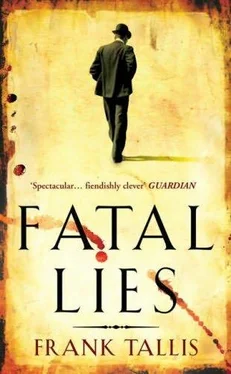Frank Tallis - Fatal Lies
Здесь есть возможность читать онлайн «Frank Tallis - Fatal Lies» весь текст электронной книги совершенно бесплатно (целиком полную версию без сокращений). В некоторых случаях можно слушать аудио, скачать через торрент в формате fb2 и присутствует краткое содержание. Жанр: Исторический детектив, на английском языке. Описание произведения, (предисловие) а так же отзывы посетителей доступны на портале библиотеки ЛибКат.
- Название:Fatal Lies
- Автор:
- Жанр:
- Год:неизвестен
- ISBN:нет данных
- Рейтинг книги:3 / 5. Голосов: 1
-
Избранное:Добавить в избранное
- Отзывы:
-
Ваша оценка:
- 60
- 1
- 2
- 3
- 4
- 5
Fatal Lies: краткое содержание, описание и аннотация
Предлагаем к чтению аннотацию, описание, краткое содержание или предисловие (зависит от того, что написал сам автор книги «Fatal Lies»). Если вы не нашли необходимую информацию о книге — напишите в комментариях, мы постараемся отыскать её.
Fatal Lies — читать онлайн бесплатно полную книгу (весь текст) целиком
Ниже представлен текст книги, разбитый по страницам. Система сохранения места последней прочитанной страницы, позволяет с удобством читать онлайн бесплатно книгу «Fatal Lies», без необходимости каждый раз заново искать на чём Вы остановились. Поставьте закладку, и сможете в любой момент перейти на страницу, на которой закончили чтение.
Интервал:
Закладка:
Liebermann promised the headmaster that he would be brief.
“Tell me, headmaster,” he said softly, “when you entered the laboratory on the evening that Thomas Zelenka's body was discovered, did you smell anything?”
The headmaster wrinkled his nose-as if the mere mention of smell had triggered some form of malodorous olfactory hallucination.
“The laboratory always smells a little unpleasant.”
“Nothing struck you as unusual?”
“No.”
“Could you describe how it smelled?”
“Herr Doctor, I cannot see how this line of questioning can possibly prove helpful. As I have already explained-”
Liebermann raised his hands, arresting the headmaster's flow with an expression that begged indulgence.
“Headmaster, I have said that I will be brief, and I promise you I will keep my word. With respect, could you please answer the question: what did the laboratory smell of?”
Eichmann shook his head, tutted, and said: “A little like bad eggs.”
Liebermann stared at the headmaster-an inquisitorial, ingressive stare that owed much to his acquaintance with Professor Freud. Then, quite suddenly, he said, “Thank you,” and stood to leave.
The headmaster looked first at Rheinhardt and then back at Liebermann.
“Is that all you wanted to know?” Eichmann asked.
“Yes,” said Liebermann. “I have no further questions. I trust you will concede that we have respected your convenience.”
The headmaster did not appear satisfied-only suspicious.
“Where is Professor Gartner?” asked Rheinhardt.
“In the staff common room,” said the headmaster.
He observed their departure with eyes that radiated contempt.
Liebermann and Rheinhardt found Professor Gartner sitting alone, ensconced in a fustian armchair and sipping brandy from a metal hip flask. The book on his lap was Thucydides's great History of the Peloponnesian War. After some introductory civilities-to which the professor responded with considerably more courtesy than the headmaster-Liebermann repeated his question: “Tell me, Professor Gartner, when you discovered Thomas Zelenka's body, did you smell anything unusual?”
“Unusual?” repeated Gartner.
“Yes.”
“I don't think so. To be honest, I don't have a very acute sense of smell. It's never been the same since the storming of Brescia back in ‘49. I was serving under Haynau-with the first battalion, no lessand fell very badly ill. The regimental doctor didn't know what it was. He was mystified. I was sick and very weak for more than a month. When I recovered, I felt well enough. All my body parts were working-just as they did before-with the exception of my nose! The sensation of smell was dulled, blunted. In order to detect the fragrance of a flower, I would have to hold it directly under my nostrils, inhaling deeply, and only then would I catch a hint of its bouquet. My sense of taste was affected, too. Subsequently, I've only ever enjoyed foods with very strong flavors. A good spicy goulash, for example.”
Liebermann attempted to interrupt the garrulous professor, but he failed.
“I once met a neurologist from Paris,” Gartner continued, “who said that he'd heard of such things happening, and he spoke at some length about the bulbs that project from beneath the brain. A clever fellow if ever there was one. He had studied with Charcot and knew his Virgil as well as his anatomies. Apparently, there are some infectious organisms that attack nerve tissue, causing permanent damage; however, I should say-if my memory serves me correctly-he associated such cases with tropical rather than Mediterranean diseases.” Professor Gartner took a swig from his hip flask, hummed pensively, and added: “I'm sorry, Herr Doctor. I seem to have forgotten your question. What was it you wanted to know?”
Liebermann and Rheinhardt made their excuses and left.
“Well,” said Rheinhardt, as they made their way down the stairs. “This isn't going very well, is it?”
Liebermann shook his head. “No, it isn't; however, at the same time, the science of hereditary constitution gives me good reason to remain optimistic.”
“Max, what are you talking about?”
“I will explain in due course. Now, let us return to the courtyard.”
Albert was still sitting in the same place, although the movement of his head suggested that he was now not sleeping but observing the spiraling of dead leaves in a vortex.
When Rheinhardt and Liebermann arrived, he rose to greet them-saluting and clicking his heels together to produce a hollow knock.
“Ah, my dear fellow,” said Rheinhardt. “There you are. Allow me to introduce a colleague of mine, Herr Dr. Liebermann. He would like to ask you some questions.”
Albert smacked his lips.
“A doctor…”
“Yes.”
“Permission to report-I'm as fit as a fiddle, sir. Haven't had a day's illness in years.”
“Well,” said Rheinhardt, “I'm very glad to hear it; however, the good doctor has not come to inquire about your health. He wants to ask you about the recent tragedy.”
Rheinhardt glanced at his friend.
“Do you remember the boy Thomas Zelenka?” asked Liebermann.
“Permission to report: yes, sir. The boy who died.”
“Do you remember the evening when his body was discovered?”
“I do, sir. He was found in the laboratory, sir.”
“Now, I want you to think back to that evening. I want you to try to remember something for me.” Liebermann extended his hand, and touched the old soldier's arm gently. “When you entered the laboratory… what did it smell like?”
Albert's rheumy-eyed gaze met Liebermann's clearer one. His tongue slipped out of his mouth and proceeded to swing from side to side, coating his lower lip and bristly chin with saliva.
Rheinhardt was about to repeat the question, but Liebermann silenced him with a hand gesture.
They waited. The sound of gunfire could be heard in the distance.
“Permission to report,” said Albert. “A peculiar smell, sir… like almonds.”
55
Rheinhardt knocked on the laboratory door. The muffled sound of Becker's voice came from within: “Enter.”
Inside, the deputy headmaster was seated at a table covered with exercise books. His expression was bored and slightly irritated. Becker stood to greet them, but his face was impassive and the absence of chairs (other than his own) seemed sufficient reason to justify the discourtesy of not inviting the policeman and the young doctor to sit.
Liebermann surveyed the room and, in spite of its ugliness, its exposed pipes, and stained walls, he smiled.
“This takes me back,” said Liebermann, nostalgically. “It reminds me of the lab in my old school. I was very fond of chemistry.”
Becker showed no sign of sympathetic interest. Instead, he waved his hand over the table and said: “Gentlemen, I have much to do today.”
This plea for brevity resonated with the headmaster's: Liebermann supposed that the two men had convened earlier, resolving to obstruct the investigators with a show of churlishness and bad manners.
Liebermann sidled up to the deputy headmaster and examined the book he was in the middle of marking. The boy's work was barely visible beneath a descending curtain of red ink.
“Ahh,” said Liebermann recognizing a distinctive illustration from his youth. “The Liebig condenser. You know, I was once told that it wasn't Baron von Liebig who invented the condenser at all but someone else entirely. Is that true, Dr. Becker?”
The deputy headmaster straightened his back and adjusted his gown. Having been presented with an opportunity to demonstrate the depth of his knowledge, he was unable to feign indifference.
“The earliest condenser-to my knowledge-was described by Christian Ehrenfried Weigel in 1771.”
Читать дальшеИнтервал:
Закладка:
Похожие книги на «Fatal Lies»
Представляем Вашему вниманию похожие книги на «Fatal Lies» списком для выбора. Мы отобрали схожую по названию и смыслу литературу в надежде предоставить читателям больше вариантов отыскать новые, интересные, ещё непрочитанные произведения.
Обсуждение, отзывы о книге «Fatal Lies» и просто собственные мнения читателей. Оставьте ваши комментарии, напишите, что Вы думаете о произведении, его смысле или главных героях. Укажите что конкретно понравилось, а что нет, и почему Вы так считаете.












